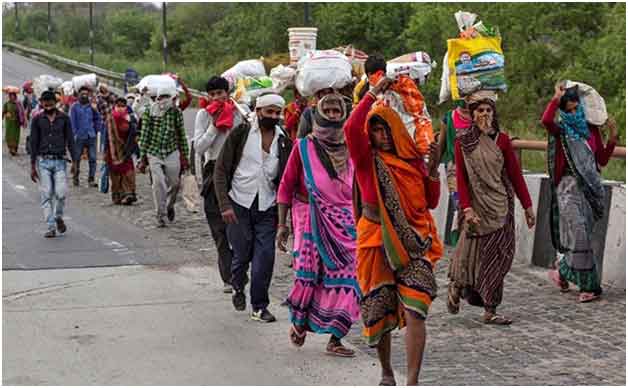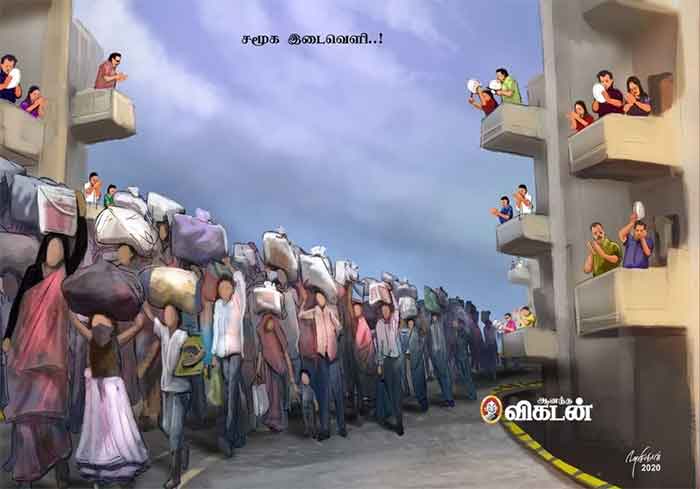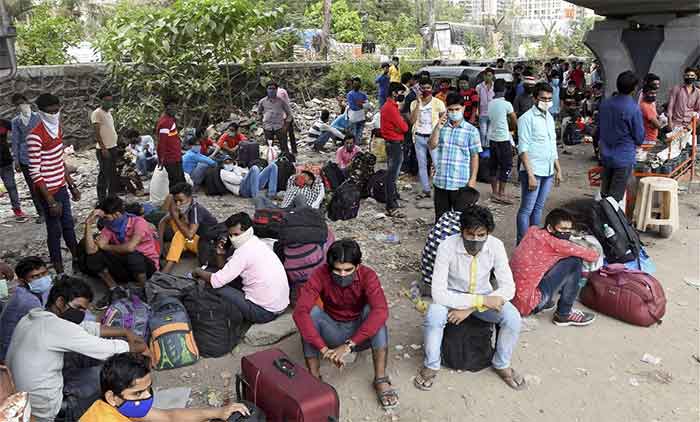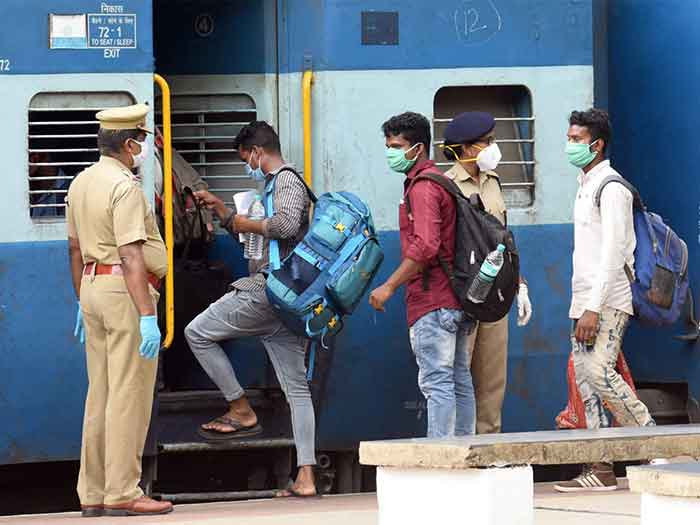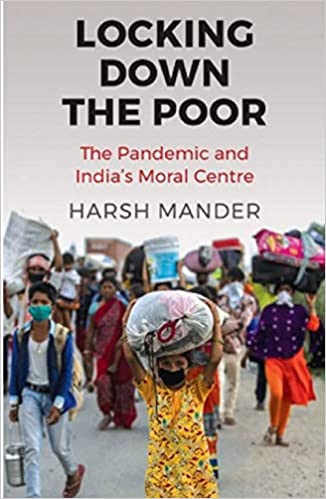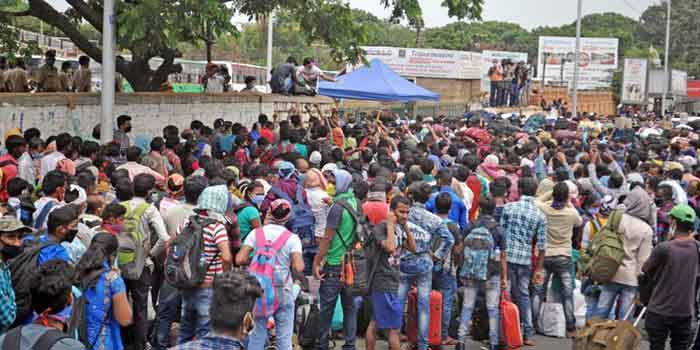
Bangalore With Migrants is a coalition of volunteers and organisations who have come together to respond to the crises around migrants resulting from the announcement of the lockdown. Since March we have been working to help the migrants meet their basic needs of food and shelter, and also to travel back to their home if they wish to do so. Despite all our efforts to work with the government in this endeavor, we continue to witness the workers having to bear the cost of the chaos and confusion resulting from the inefficient functioning of the government.
As per the Supreme Court order dated June 5, 2020, it has given 15 days to all states to complete the process of getting the migrants back to their home states. With just a few days to go, not even fifty percent of those registered on the Seva Sindhu portal have left for their hometowns, as per the government’s own records. This points to huge gaps between government intent, as manifested in their Writ Petition to the Supreme Court and various government circulars, and the actual implementation on the ground.
Through summarising our experience in trying to get the systems to work, this open letter is yet another attempt on the part of civil society to highlight both the plight of the workers and the responsibility of the State to protect the lives, livelihood and dignity of all citizens, no matter what their domicile is.
We write to you on behalf of several civil society organisations, trade Unions, NGOs, and concerned citizens in Bangalore who have come together and formed the collective Bangalore With Migrants. We have been voluntarily reaching out to migrant and daily wage workers directly impacted by the sudden announcement of a lockdown by the Prime Minister on March 24 in the context of the COVID 19 crisis. Karnataka employs workers from various states including Bihar, Jharkhand, Uttar Pradesh, Orissa, West Bengal and Assam to name a few. All of them were overnight left jobless, with no food or money, and in some cases, homeless. They have had to face the consequence of a situation for which they are not responsible!
Soon after the announcement of the nationwide lockdown, the uncertainty of its duration and of getting employment and fear of contracting the virus, left the workers, including many women and children, with no choice but to look at returning home. Some took to leaving by foot, by cycle or hitching/hiring trucks and buses. The pandemic and the measures taken to counter it has created a mass panic and humanitarian crisis of insurmountable proportions.
The Government of Karnataka did announce a slew of measures ranging from hunger helplines, distribution of food, dry rations and relief camps during the period of the lockdown. By mid-April measures to take those workers wishing to go back home were announced including shramik trains, an online portal for registration and mustering centres for workers to assemble at and take shelter in where food would be provided by BBMP before they boarded the trains. In response to several Public Interest Litigations filed in this period, the government also passed several orders putting into place fairly well conceptualised systems to ensure the efficient implementation of these measures.
Over the past three months we have directly been in touch with thousands of workers. Attempting to work with and hold accountable the various related arms of the government including BBMP, labour department, police and food and civil supplies, we have been reaching out for food and relief including cash transfers in all the phases of the lockdown. And post the lockdown, we have been trying to coordinate the safe return of the workers through ensuring their registration at police stations or on the seva sindhu portal, facilitating information related to trains and ensuring that they reach the proper mustering centres and get shelter and food as assured by the government, provided additional food and water for the journey and facilitated their registration before they board the trains back home.
Despite all these herculean efforts however at the end of three months we are still left with several questions.
Has the support of the government been adequate and their response systematic and timely? Do the workers feel that the government has been sympathetic and seriously considered their plight with regards to their basic need for food and shelter? Would the workers have felt the desperate need to return home if the government had taken adequate measures and communicated these clearly to them? The answer to each of the above questions is unfortunately, a clear “no”!
As per the Supreme Court order dated June 5, 2020, 15 days has been given for all states to complete the process of sending the migrants back to their states. On June 9th we wrote a detailed note to the concerned nodal officer Shri Manjunath Prasad based on our experience over the past months suggesting several measures to streamline and make accountable processes related to movement of migrant workers as committed to by the Government of Karnataka in its Writ Petition dated June 3rd filed before the Supreme Court and as detailed in a government circular dated June 3. But to date we continue to witness and the workers continue to bear the cost of the chaos, confusion and non coordination on the part of the authorities that is further increasing their insecurity and misery.
With barely a couple of days left for the Supreme Court deadline to be met we are forced to write this open letter to once again draw to your attention the huge gaps that continue to exist between the intent as stated in the Writ Petition and government circulars and the actual implementation on the ground.
- Seva Sindhu and multiplicity of registration processes
While the government had announced that registration on the Seva Sindhu portal was necessary, on the other hand, police stations were also registering migrant workers and sending them on the trains. Quotas were given to different police stations. Non transparency on how the police were deciding which people would make it to the train on a particular day led to a lot of confusion. This saw migrants in hundreds and thousands congregating at police stations and even spending night after night there in the hope that they would be able to make it to the train. After a lot of pressure, advocacy and media coverage the system of mustering centres was put in place.
While the confusion around the police stations was going on in the first few weeks, there were large number of migrants walking back home. The BBMP was tasked with bringing them to centres like wedding halls and the BIEC where they were sheltered until they were put on trains. The news that workers are being sent on trains from these temporary shelters, made hundreds and thousands congregate at these centres as well. Instead of managing and facilitating these large number of migrants wanting to head home, they were prey to lathi charges. This happened at police stations, wedding halls and the BIEC. On May 18, 2020 particularly, thousands were beaten and chased from the gates of BIEC.
Apart from the fact that the Seva Sindhu site was unstable at times, it has been a challenge for the workers to fill the form as it required access to a computer or a smartphone. Some ended up paying a hefty sum to an agent or a small shop in their vicinity to get the job done. Many migrants have not received an acknowledgement on completion of registration, thus causing tremendous anxiety for the migrant. In case of group/family registrations or families, the acknowledgement gives no indication of the people included in the form.
- Helplines, Helpdesks and Information
It was stated that Help desks would be provided in 198 BBMP wards and 176 Tahsildar offices to aid the migrants in the registration process. The officer present at the help desk was to provide information regarding arrangements made by the government regarding food and shelter till they board the train. Posters were to be put up in the office building to provide information and publicity and the DC’s were to give wide publicity of the presence of the help desks. Further SMSs would be sent to the migrants on completion of registration once the trains are scheduled to his home state, when he would also be informed of the mustering centre to which he has to report.
The reality is that there is no information in the public domain about nodal officers, helplines, shelter homes, quarantine guidelines in the destination state, process and supportive documentation needed. It is only in a few cases that after registration the migrants have received clear and timely messages with train date and mustering centre details. Often the message sounds threatening (If you do not report on the said day no arrangements will be made by the Govt for your transportation) or in some messages they mention that it’s the last train.
On June 14th, we received intimation from the West Bengal and NE Nodal Officer’s office that a helpline had been set up for these states with details of the phone number. Upon calling the number we realised that the only information that they would give is that all desirous of returning to West Bengal or the NE states go to Manpho Convention Center and await a train. Though the NO had confirmed that there was a train to WB on June 15th, the person who responded to the call did not have this information. He also did not know that the status of the NE state’s willingness and preparedness to facilitate return of migrants to their states. Later on we were told by the Nodal Officer that the number shared with us was not a helpline but just the office number! There is already adequate confusion without members of the same office giving out contradictory information!
It is fact that none of the Helplines set up by the government since the beginning of the lockdown whether it was the hunger helpline for food and ration kits in the earlier phase or for travel in this phase have actually worked. And the workers have been rendered absolutely helpless where credible information is concerned.
- Mustering Centres and shelters
According to the government circular migrants will be directed to assemble at their state’s mustering centre on the date of travel and food, water, sanitation, health check up and shelter will be provided by the government. From here the workers will be transported by government buses to the stations. A Nodal Officer will be incharge of each mustering centre & police will make the security arrangements.
The reality is that migrants have very often not been informed in advance of the mustering centres to which they need to report, their location or time at which they have to report there. They depend on “word of mouth” or information given to them by civil society groups.
Mustering centres are at times changed at the last minute or conflicting/confusing information is given by different Nodal Officers / other functionaries, leading to a lot of chaos and migrants running from pillar to post. At times multiple mustering centres are announced leading to conflicting information.
The June 3rd circular clearly states that the mustering centres also serve as shelters and migrants can stay there until the next train. Yet, guards and policemen at mustering centres often turn away workers, again not instructed about directives about their right to be accommodated, or right to enter and travel without an sms or SS registration.
Some private initiatives such as shelter homes were operational but shut at short notice and migrants were forced to move from one to another.
Migrants are at times also turned away from a mustering place after it reaches full capacity or when the migrant reaches the previous day, if he is coming from a distant place. This is also in contravention to the June 3rd circular which clearly says that migrants can reach the mustering centres which will serve as shelters till the train leaves. Having vacated their rooms they have nowhere to go. Some are forced to leave their rooms since either the employer has closed operations or because payment to the returning migrant has been made and the employer evicts them.
On at least two occasions miscommunication by the government led to massive crises at the mustering centres. On May 23, 2020 more than 6000 workers gathered at Tripura Vasini to take the one train to Odisha scheduled on that day. SMSs had been sent to several thousand workers instead of the numbers needed to fill one train. There was a similar situation on June 12, 2020 when more than 4000 migrants wishing to travel to Assam arrived at the designated mustering centre at Bangalore Palace. In both instances thousands of workers were left without food, water and toilets for hours and an insecurity regarding when they would be able to make it to the trains.
What is even more worrying is that with such large crowds gathering it becomes impossible to observe any norms related to physical distancing exposing the workers to the possibility of contracting and spreading the virus which the government is trying to contain.
- Schedule of Trains
The trains schedules are not communicated in advance to enable the migrant to plan his departure, as committed by the government. Migrants have no access to information regarding the trains operating on a particular day. Most migrant workers have to give up their rooms and wind up their operations when they decide to take a train. They often have no employment and no wages. Many come from towns and areas outside Bangalore city. To do this with uncertain or no information is a harrowing experience for them.
Even for the volunteering groups the information of trains and mustering centres is not available till the night before the departure of a specific train. These groups are inundated with phone calls from the migrants. They are not equipped to function like a helpline!
An outcome of this is that several hundred migrants have left Bangalore to walk to their homes. Sometimes hitching rides with trucks and good vehicles, some walking hundreds of kilometers to cross the border at Andhra Pradesh, only to be sent right back by the police or if they are lucky, they have hitched rides. While the Shramik trains were launched in the first week of May and were announced to be free for the migrants’ travel, many from Karnataka had to pay approximately thousand rupees to buy their ticket. Only on May 23rd did the Karnataka government announced that it would provide free travel.
Additionally we have also observed that the numbers of workers being allowed on the trains have been systematically increased resulting in over crowding and little space for physical distancing. Once again making the workers vulnerable to the virus and its spread.
`5. Coordination between government agencies and civil society organisations
As mentioned earlier different members of this network have been trying to reach out at several points in the past months to the responsible authorities within the government to ensure that all that is promised to the workers reach them. In the recent past, to ensure the smooth travel of migrants back to their home states representatives of AICCTU has met with Mr. Manjunath Prasad on May 14, 2020. At a meeting convened by the Urban Development Department on May 15, 2020, where all concerned departments were present, AICCTU had communicated most if not all the issues listed above. Additionally, in a meeting on SHRC on June 2, 2020, all the above mentioned issues have been brought to the notice of Principal Secretaries of the concerned departments including Mr. Manjunath Prasad, the Nodal Office incharge of all migrant issues. A letter was sent by Bangalore with Migrants on June 7, 2020 to Mr. Manjunath Prasad and another communication on June 12, 2020. A letter has also been sent by Stranded Workers Action Network (SWAN) on June 14th.
And yet a huge gap exists and workers continue to bear the impact of the chaos and confusion within and between government agencies. Decisions are knee jerk and last minute, communication is confused and contradictory, Senior officials blame others when they should be taking the responsibility as ‘designated in charge’. Unfortunately, accountability is non-existent.
We write this letter as there are still many migrants who wish to return. The government in its writ petition had mentioned that as on May 29 there were 6 lakhs migrants, registered with Seva Sindhu portal who had not left for their hometown as per their records. Between May 30th and June 10 only 50 % of the requested trains had run and close to only 70,000 migrants had made their way home by Shramik trains. This itself clearly shows that the demand for trains far outstrips the supply!
We do not have access to the exact numbers of those wishing to go back as it is possible that many are not coming to the mustering centres since they do not have the information since the systems have not worked. The government officers insist there are not enough migrants to run the trains as there are not enough workers at the mustering centres. But the migrants cannot vacate their rooms and come to the mustering centres without knowing when the train to their home state is to leave.
The High Court has repeatedly given directions to the Government of Karnataka that a clear policy to handle migrant travel to home states be put in place and that this should be made public. The affidavit submitted by the Government of Karnataka in the High Court on June 3rd is a very good blue print on how the entire task of helping migrants reach home can be managed and organised. However, the government has neither made this plan public nor has it implemented the same. It is therefore not a question of the ability of the government, rather one of its intent!
Does the government want to facilitate migrants wishing to back home or does it wish to serve the interests of the builders lobby who had in the early days of this process managed to convince the government to cancel all Shramik trains? Let us remember that the Government of Karnataka (GoK) had decided to cancel trains for migrant workers departing to their home States, which was taken after a meeting between the Chief Minister and the Confederation of Real Estate Developers Associations of India (CREDAI), and communicated via a letter dated 5 May 2020 to the South Western Railways. Migrant workers and members of civil society organisations had protested against that move through a placard protest and submission of an open letter to the Chief Minister, who was then forced to withdraw this decision.
We do not deny the positive role played by several officials from different agencies who have responded proactively. But this has done little to make the system work efficiently and empathetically. Possibly this is because the government lacks the political will to send home the migrant workers. As a result of which despite all the collective efforts of the administration workers have again started walking back home. On June 14th, 20 migrant workers from Doddaballapur were found on the highway to Hyderabad walking to West Bengal. This surely is a blot on the history of Karnataka!
We have in this open letter raised only those issues linked to travel of migrants back to their home states. But the migrants have faced untold misery from time the unilateral, autocratic lockdown was announced on March 24th. They have had to face starvation, non payment of wages, evictions, loss of employment and livelihoods. They have faced abuse in the localities they live in, unequal treatment during relief and far worse than anything is the indignity with which they have been treated.
It is incumbent on the State to protect the life, livelihood and dignity of all citizens, no matter what their domicile is. As elected representatives of the people and officials in different wings of the government, it is your collective responsibility to ensure that migrant workers who have contributed to building cities and the rural economy in Karnataka, are treated with dignity and respect by ensuring that they do not face anymore trauma in their attempt to reach their homes.
Endorsed by –
Organisations:
Bangalore with Migrants with –
- Stranded Workers Action Network (SWAN)
- AICCTU
- Whitefield Rising
- Gamana Mahila Samuha
- Voice of Sarjapur
- Naavu Bharateeyaru
- Domestic Workers Rights Union
- Stree Jagruthi Samithi
- Citizens Forum for Mangalore Development
- INSAF – Karnataka
- Growthwatch
- Ashirvad centre for social concern
- Friends Foundation
- Swaraj Abhiyan
- Daishi Foundation
Individuals :
- Mahadevan
- Ramesh Ganesan
- S Muralidharan
- Abhijith Rao
- Geeta Muralidharan
- Usha Rao
- Shaheen Ali
- Sudha Suresh
- Shridevi B M
- Chetana Ganesh
- Priyanka Chaudharui
- Prakash Nedungadi
- Megha Gulati
- Indira Vijaysimha
- Joanna Koshy
- Nakul
- Vartiki Jaini
- Rajani SS
- Anupama
- Adithi Chanchani
- Senthil
- Tara Mitra
- Ampat Koshy
- Rosemary Vishwanath
- Uma Ravikumar
- Rukmini Iyer
- Yash Kaul
- Bincy Subhash
- Sunanda Bhatt
- Niloufer Zhaveri,
- Swasthika R,
- Tanuja Viswanath
- G Viswanath
- Mridula Paul, LLB MPhil (Oxon)
- Swarupa
- Deepa Adhikari
- Gunjan Zutshi
- Yogada Joshi
- Vandana Srivastava
- Devika Narayan
- Preeti Balachandran
- Anuradha Chandra
- Professor Rajendran, Azim Premji University
- Aarthi Sridhar
- Sudha N
- Naavu Bharateeyaru
- Benson Isaac, Azim Premji University
- Harshita Dakoju
- Sriram Subramanyam
- Seema Mundoli, Azim Premji University
- Vaishnavi C.
- NIthya R.
- Abitha C
- Aarti Mundkur
SIGN UP FOR COUNTERCURRENTS DAILY NEWSLETTER

